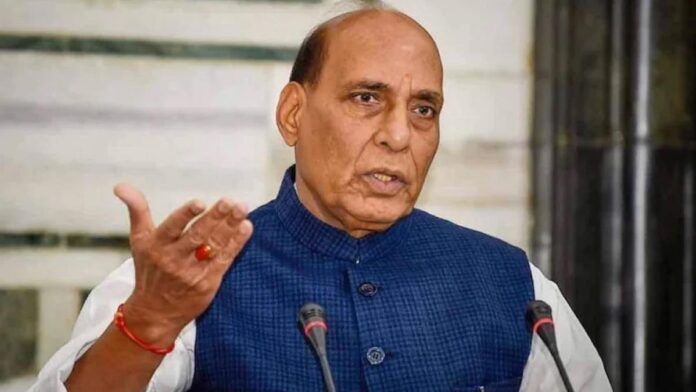New Delhi: Defence Minister Rajnath Singh told Parliament on Monday that India’s stance remains firm that terrorism and talks cannot go together. He said Operation Sindoor, launched after the Pahalgam terror attack, has only been paused and will resume with greater force if Pakistan engages in any future “misadventure”.
Addressing the Lok Sabha during a discussion on India’s response to the Pahalgam terror attack that killed 26 people, Singh, as reported by KNO, said Operation Sindoor was a decisive military response that achieved all its stated objectives without targeting civilians.
The operation was launched after a detailed assessment by the Indian armed forces, he said, adding that the purpose of the operation was to target terrorist camps, their supporters, and to destroy them.
Operation Sindoor, according to Rajnath, was not a campaign to occupy land or escalate to full-scale war, but a targeted strike. “Our aim was not to occupy territory or start a full-scale war. It was only to locate and destroy terror camps,” he said, adding that India’s defence systems ensured that no critical assets were harmed during the conflict.
The Defence Minister said that coordinated strikes were carried out on nine terror sites in Pakistan and Pakistan-occupied Kashmir (PoK). “The operation was completed within 22 minutes,” he said, adding that over 100 terrorists were killed.
The strikes on May 10 also targeted key Pakistani air bases, including Nur Khan Air Base in Rawalpindi, PAF Base Mushaf in Sargodha, Bholari Air Base, and PAF Base Shahbaz in Jacobabad.
Singh said India informed Pakistan in advance about the nature of the strikes. “On May 7, Indian DGMO called the Pakistan DGMO and informed him about the rationale of the attacks; told him they were non-escalatory,” he said.
Rejecting suggestions that the operation was paused under external pressure, Rajnath said, “This is completely wrong. In my political life, I have tried not to speak untruths.” He said the operation was paused only after achieving the political and military objectives defined before and during the conflict.
He recalled that India had made multiple efforts over the years to build peaceful relations with Pakistan. “Whenever India extended a hand of friendship, the response was war,” he said. “We once spoke the language of the Lahore bus journey, but Pakistan did not understand that. We now respond with the Balakot strike.”
The Defence Minister said the armed forces were granted full operational freedom, including the authority to select targets. He clarified that the objective was not to wage war, but to compel the adversary to back down in the face of India’s military strength.
Referring to previous actions like the 2016 surgical strikes and the 2019 Balakot air strike, Singh said the government had adopted a new approach. “Our government made numerous efforts to establish peace. But later, through these operations and now Operation Sindoor, we have taken a different path.”
“If there is any misadventure in the future, the operation will resume,” he said, adding that the global community had condemned the Pahalgam attack and backed India’s right to respond.
Rajnath also recalled the 2008 Mumbai terror attacks, calling it one of the deadliest in India’s history. He said the government in power at the time failed to respond effectively, and noted that no major global platform, including the BRICS joint declaration, even acknowledged the attack.
Singh said Prime Minister Narendra Modi introduced a firm approach to tackling terrorism, including cross-border strikes inside Pakistan, a policy he believes earlier governments should have adopted. He also noted that during the SCO defence ministers’ meeting, no joint statement was released because India refused to soften its position on terrorism.
The Defence Minister said India has shifted its approach to dealing with terrorism under Prime Minister Narendra Modi’s leadership. He said that instead of sending dossiers, India now responds with action aimed at dismantling the source of terrorist activity. According to Singh, this approach is based on the idea that India must directly address the origin of cross-border threats and has the capacity to act when required.
Rajnath said that the current government has adopted a clear and structured policy in response to national security threats. “Under Prime Minister Modi, India does not stop at documentation. It goes to the root of terrorism and has the strength to uproot it,” he said.(KNO)

